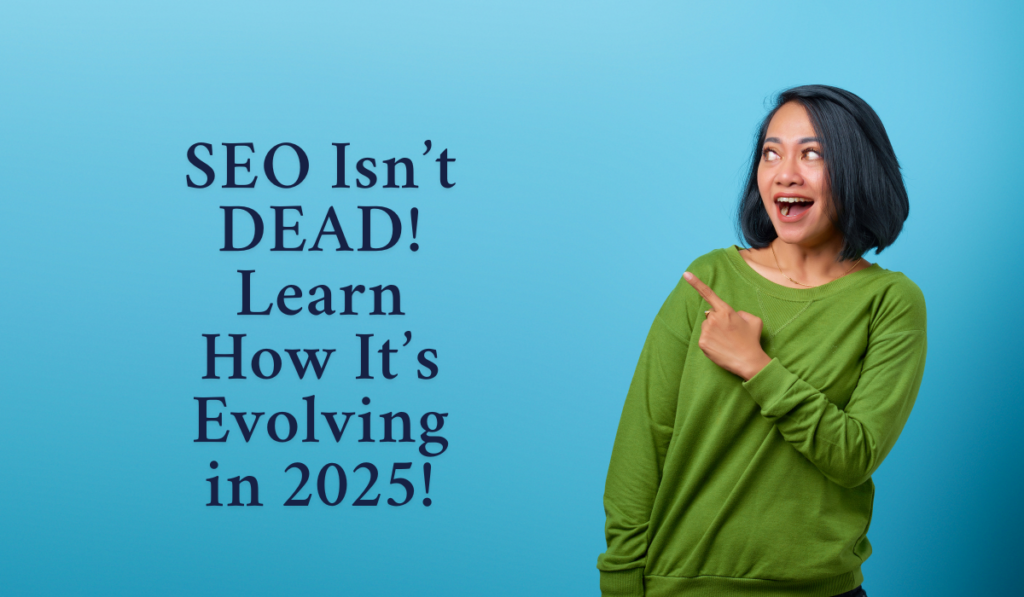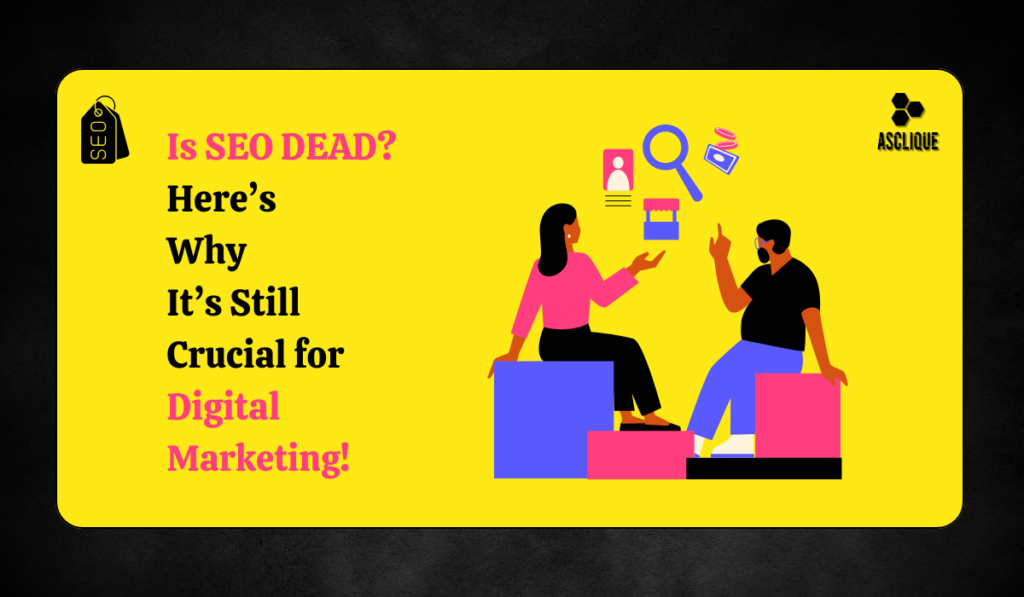As the landscape of digital marketing shifts and grows, one constant remains: is SEO dead? With annual algorithm tweaks, novel developments like AI, and the modification of consumer behavior, speculations arise concerning the future of search engine optimization. The reality: SEO is not dead-it’s evolving faster than anyone can dream.
This article analyzes what spurred the “SEO is dead” conversation, how SEO has evolved, and what modern strategies businesses should adopt to remain relevant in 2025 and beyond.
Why Do People Keep Saying SEO Is Dead?
The rumors about SEO’s demise typically surface whenever there’s a major disruption in the way people search or how Google ranks content. Let’s look at the main reasons people believe SEO is on its way out:
Frequent Google Algorithm Updates
With constant changes in algorithm (BERT, MUM, and some Helpful Content Update), SEO is a moving target. Thus, many old tactics that are no longer effective may invoke anger, stress, and fright.
Zero-Click Searches
It’s less about clicks and more about getting direct answers from SERP through features like snippets and knowledge panels or via AI answers from Google.
AI & Conversational Search Tools
Thanks to AI tools like ChatGPT, Google SGE (Search Generative Experience), and Bing Copilot, users find real-time answers, completely avoiding traditional search sometimes.
Content Saturation
With an explosion of blogs, videos, and infographics, organic ranking competition has never been harder. It’s really easy to feel that your content is just getting lost in the noise.
Why SEO Is Not Dead – But Has Evolved

Rather than being dead, SEO has matured into a more strategic, user-focused discipline. Here’s why it’s still relevant — and powerful:
Search Engines Remain the Starting Point of Internet
Currently, Google handles more than 8.5 billion searches per day (in 2025). People are still using search engines to find information, compare products, and reach decisions.
Organic Traffic Still Accrues the Most Returns
SEO remains among the most cost-efficient avenues for bringing in long-term high-quality traffic, especially when compared to PPC advertising.
SEO Now Matches User Intent
Current SEO practices focus less on keywords; rather, SEO is an incredibly insightful domain that focuses on understanding what users actually intend to find and providing the relevant content.
Local SEO and Mobile Search Are Going Hand in Hand
Local queries with “near me” have surged with the increase in mobile search. Businesses with a local search optimization strategy will experience rapid conversion.
AI Is Changing the Game – Not Ending It
AI-based tools serve the advanced goals of SEO: keyword research, content planning, determining user behavior, and personalization of search.
How SEO Has Changed Over Time
SEO has evolved significantly from its early days, and understanding these shifts is critical. Here’s how SEO has transitioned:
| Then (Old SEO) | Now (Modern SEO) |
|---|---|
| Keyword stuffing | Intent-focused content |
| Buying backlinks | Earning authoritative backlinks |
| Exact match domains | Brand-centric, user-first websites |
| Desktop-first | Mobile-first indexing |
| Focus on ranking | Focus on user experience (E-E-A-T) |
| Static content | Regularly updated, multimedia-rich content |
Modern SEO Strategies That Work in 2025
To succeed with SEO today, you need to align your strategy with how search engines understand content and how users consume it.
Focus on Topical Authority
This means creating content hubs around specific topics to present keeping in mind expertise and depth and not be isolated blog posts.
Embrace Semantic Search
Natural language and keywords of semantic import are preferably used here respectively as to give conversation-specific meaning sought by people mostly during voice search and AI assistants.
User Experience (UX) Related Optimization
With respect to Core Web Vitals, Google looks into page sort time, mobile responsiveness, page interaction, and layout stability.
Leverage Structured Data (Schema Markup)
This allows search engines to understand the content better and therefore make websites entitled to rich results.
Create High-Value, Multimedia Content
The contents in text with images and videos should be present. Google favors this type of content for user engagement and thorough responses.
Update and Refresh Content Regularly
Fresh content is preferred by search engines. Thus, modifying older posts with the latest statistics, internal links, and examples will help maintain or improve rankings.
The Role of AI in the Future of SEO
AI isn’t replacing SEO — it’s making it smarter.
- AI Tools help in generating ideas for content, clustering keywords, and optimizing meta descriptions.
- However, with AI, Google’s (SGE) offers more emphasis on authoritative content and awards expertise rather than simple keywords.
- Natural and human-like phrasing is directed toward SEO by voice search and conversational artificial intelligence.
SEO Is More Than Google: A Multichannel Mindset
In 2025, optimizing for visibility means thinking beyond just Google:
- YouTube SEO – Optimizing video titles, thumbnails, and transcripts
- TikTok & Instagram SEO – Using hashtags, captions, and keyword-focused descriptions
- Amazon SEO – For product-focused businesses, optimizing product listings and reviews is essential
- LinkedIn SEO – Professionals now optimize profiles and posts for B2B reach
Modern SEO Strategies to Follow in 2025
As SEO evolves, so must your strategies. To stay ahead of the curve in 2025, consider the following:
E-E-A-T is of utmost importance (Experience, Expertise, Authoritativeness, Trustworthiness)
A content experience/expertise first kind of perspective is being upheld by Google. Therefore other rankings have become more crucial, and especially so have indicators of trust like backlinks and user engagement.
Know User Intent, Become an Expert, and Optimize for It
Modern concepts of SEO are prioritized on intent rather than keyword matching. Knowing the reason the search has been done will subsequently enable you to know what the user truly needs; hence you can create a piece of content that connects with those needs on a deep level.
Use Structured Data and Schema Markup
Structured data will help improve content understandability for search engines, therefore increasing the chances of appearing in rich results such as featured snippets, knowledge panels, and so on.
Mobile Optimization
Mobile optimization must be granted primary consideration with constant mobile-first indexing. Your site should be responsive and load quickly on mobile devices so improving its ranking in search engines.
Quality in Multimedia Content
The consumption trends among users nowadays have shifted towards video, images, and interactive content. The current Google algorithm favors rich media content such as videos, infographics, and podcasts. Blend them into your SEO strategy for user engagement.
How to Keep Up with the Evolving Nature of SEO
SEO is not static—it’s constantly evolving, so staying up to date is essential. Here’s how you can stay ahead:
Follow SEO Industry Blogs and News
Stay informed about the latest SEO trends and updates by following trusted SEO blogs like:
- Asclique Innovation and Technology (https://www.asclique.com/blog/)
- Moz Blog (https://moz.com/blog)
- Search Engine Journal (https://www.searchenginejournal.com)
- Search Engine Land (https://searchengineland.com)
- Neil Patel’s Blog (https://neilpatel.com/blog)
- Ahrefs Blog (https://ahrefs.com/blog)
These sources offer timely insights into changes in search algorithms, new strategies, and the latest best practices.
Use SEO Tools and Analytics
Tools like Google Analytics, Google Search Console, SEMrush, Ahrefs, and Moz monitor website performance, track keyword rankings, and study competitorsin order for you to apply this data to improve and change your SEO campaigns.
Engage in Continuous Learning
Because SEO keeps changing, the marketer should in continuing studies. Use for example Google’s Digital Garage or the HubSpot Academy to learn with Yoast SEO Academy to stay advanced in new skills regarding different SEO approaches.
Test and Optimize
Don’t just theorize; always put a new SEO strategy to the test. Mix and match content formats, keywords, and optimization approaches in a laboratory environment and then engage in massive A/B tests with the popular audience.
Participate in the Groups: Follow Thought Leaders
Include yourself among those engaging SEO professionals and other thought leaders into LinkedIn, Twitter, blogs, and online forums for SEO. SEO Chat and, of course, Reddit’s r/SEO are communities where you can find great exchange of ideas and creation of minds.
Conclusion: SEO Is Not Dying; It Is Changing
The notion that SEO is dead couldn’t be further from the truth. Sure, the whole environment is changing fast; but SEO remains the principal technique for rendering digital visibility and website existence. Businesses that stay on top of trends, embrace user-centric approaches, and capitalize on technological changes will continue to thrive in this fast-paced world of SEO.
FAQs
Has AI replaced SEO?
AI maintains its influence over SEO but does not outright replace it. AI-related instruments lend a helping hand in, say, keyword research, but human creativity and strategy is still important.
Can SEO still drive traffic in 2025?
Yes, SEO continues to be regarded as one of traffic-driving channels with immense power, especially towards the long-tail keyword, quality content, and authority content.
What are the biggest challenges with SEO today?
The biggest challenge has been adapting to the algorithm changes while AI-driven tools are giving search answers and, of course, outrunning competitors in most highly competitive niches.
How can I improve my website’s SEO?
Improve user experience, refresh old content, optimize the website for mobile, incorporate multimedia content, and implement structured data for visibility.
Will SEO still be relevant in the future?
Definitely! While search engine optimization will change forever, as long as people look for answers, it will remain an indispensable part of any prosperous digital marketing strategy.

